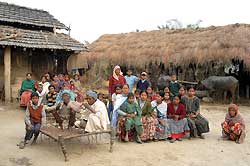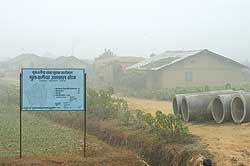 Satariya and Sohanpur in the fertile plains of the Karnali in Bardiya district are just a few kms apart. Villagers in both places have suffered and lost relatives in the conflict. In Satariya, the indigenous Tharu community is generally supportive of the Maoists, while in Sohanpur they aren't.
Satariya and Sohanpur in the fertile plains of the Karnali in Bardiya district are just a few kms apart. Villagers in both places have suffered and lost relatives in the conflict. In Satariya, the indigenous Tharu community is generally supportive of the Maoists, while in Sohanpur they aren't. Driving into Satariya, the local guide gets nervous. "This is Maoist territory, it is risky, please be careful with your questions," he warns as we reach the quiet, isolated village. Two hours drive west of Nepalganj, many families here have willingly sent their children to join the Maoists. No coercion, no forced recruitment.
Because of this, Satariya has suffered retribution from the security forces and many Tharus have disappeared. No one suspected of being a Maoist ever returns after being taken in for questioning around here. Bardiya has the highest number of disappeareds in Nepal.
Parents gather around us with photographs, some with just negatives, of their missing sons and daughters. They plead with us to help them trace lost relatives. "All we want is to know if they are dead or alive," says 50-year-old Dil Maya Tharu. A feeble looking old man nearby has waited two years in vain for his son to come home after security forces picked him up from his radio repair shop at Motipur. "If my son is dead, I just want to see his body so I can cremate him, we will be satisfied with the truth," he says.
A teenager, looking cold and indifferent, stands out in the crowd. He gestures that he wishes to speak privately. Entering a nearby house he latches the door. He is silent for a minute, then says: "People here support the Maoists but we have to be careful because there may be informers," says Buddhi Tharu. The 17-year-old lost his sister, two years older than him. "She was unarmed when they arrested her. Yet the next day, Radio Nepal announced that she was carrying a gun." It's been a year since the family saw her. Buddhi believes she is dead. "If she died, then she is a martyr who sacrificed her life for a good cause," he adds.
 Buddhi is confident the Maoists will win the war. "If they can achieve so much in just eight years, imagine the impact of the revolution in another 20," he says. Several members of his family are either sympathisers or active members of the Maoist party. His uncle was recently shot by security forces while at a Maoist cultural program. Two cousin sisters who joined the Maoists as militants have also disappeared. The family is not sure whether they are still alive.
Buddhi is confident the Maoists will win the war. "If they can achieve so much in just eight years, imagine the impact of the revolution in another 20," he says. Several members of his family are either sympathisers or active members of the Maoist party. His uncle was recently shot by security forces while at a Maoist cultural program. Two cousin sisters who joined the Maoists as militants have also disappeared. The family is not sure whether they are still alive. Buddhi's family and other Tharus here were easy recruits for the Maoists. The formerly landless villagers are now in charge and own big tracts of farms redistributed equally among the most impoverished families. "The jamindars don't even dare look into our eyes," says Buddhi. "They used to own the whole village and gave us only a small share of the crop that we cultivated."
The landlords have abandoned their farms and now live in Nepalganj. Most have no savings left. The Tharus who are still loyal to their jamindar masters are threatened by the Maoists not to visit them or give them a share of the harvests.
Fear, not support
Down the highway in Sohanpur it is a different story. Here, the Tharus don't want to be associated with the Maoists at all. The death of so many of their people has been too heavy a price for the community. Despite the arrests and disappearance of at least six people in their village at the hands of the army, they do not support the rebels.
 But this doesn't mean they support the security forces either. They fear them more than the rebels because the army patrols arrest innocent villagers and accuse them of being Maoists. "When the soldiers come here, they make a list of Maoists based on information given by our own people. There is no Maoist in our village," says 22-year-old Ram Prasad Tharu, whose father was disappeared by the security forces. "He was a simple hardworking farmer and not into politics at all." His family went to the Chisapani Army Barracks, but was told his father wasn't there. They never found him.
But this doesn't mean they support the security forces either. They fear them more than the rebels because the army patrols arrest innocent villagers and accuse them of being Maoists. "When the soldiers come here, they make a list of Maoists based on information given by our own people. There is no Maoist in our village," says 22-year-old Ram Prasad Tharu, whose father was disappeared by the security forces. "He was a simple hardworking farmer and not into politics at all." His family went to the Chisapani Army Barracks, but was told his father wasn't there. They never found him. Tharus in this village still own their land and most of the youth go to school and colleges and help their parents on the farms. "All we want is peace and to be left alone," says 23-year-old Rosan Chaudhary who, along with other young Tharus, runs a community forestry user group that helps generate income for the villagers from the forest products.
"We don't need this war. We have no expectations from the Maoists," says Rosan, who doesn't believe that the Maoists are really fighting for the Tharu. "The government can do a lot by bringing education and development programs so our young people get an education and will not be lured by the Maoists," adds Rosan. "We are no longer na?ve, we know what is good for us." Despite the disappearance of his father, he has no intention of supporting the rebels.
The army now seems to be learning its lesson and doesn't treat every Tharu as a potential Maoist. Ekaraj Tharu, a radio journalist who broadcasts an educational program in Banke, has been motivating his community to go to school. Not a single Tharu has a government job here and he thinks only education will change things. "We have never been treated equally," he says. "And now we are in the frontlines facing the bullets and dying like dogs."
Names of some of the people quoted in this article have been altered.
"No Maoist or politician did anything for us."
 The Tharu kamaiyas were supposed to have been liberated from bonded labour five years ago. They have no desire to join the Maoists, but the kamaiyas are fed up of the frequent harassment by soldiers at the Liberated Kamaiya Camps in Bardiya, Kailali and Dang.
The Tharu kamaiyas were supposed to have been liberated from bonded labour five years ago. They have no desire to join the Maoists, but the kamaiyas are fed up of the frequent harassment by soldiers at the Liberated Kamaiya Camps in Bardiya, Kailali and Dang. "We freed ourselves, no Maoist or politician ever did anything for us," says Devi B Tharu, chairman of the Freed Kamaiya Management Committee in Shantinagar along the Bardiya highway. He runs a slate-making factory to support his family. "I no longer have to worry what time to wake up and I can go anywhere I please," says Devi of his family's new-found freedom.
But not all kamaiyas are as fortunate. The land they were granted by the government is not enough to grow food on. Many kamaiyas say that they were better off working for their landlords. "I had no problem working under my jamindar. There is more hardship, but today we don't even have enough to eat," says Lahani Tharu, a 25-year-old ex-kamaiya whose jamindar was forced to let her go because of government penalties.
Two years ago, Sita Tharu's husband was dragged away by the security forces who accused him of being a Maoist. He never came back and Sita is looking after her five children by herself. Sita says freedom has made her community more vulnerable to harassment by the Maoists and the army.
"I'd rather not have my freedom," she says. "Who will help me to bring up my children, feed and educate them?" Her 15-year-old daughter is now forced to go back to working as a kamaiya to feed her mother and siblings. She sends them money and clothes from her landlord's house.


